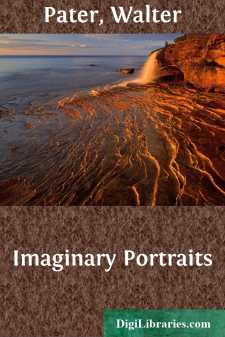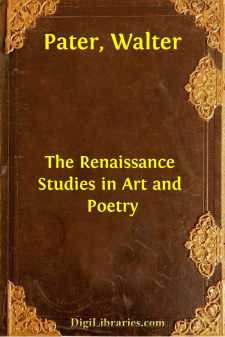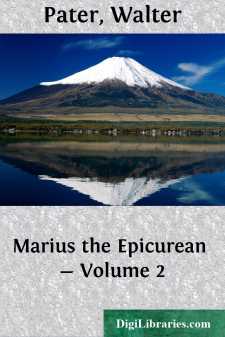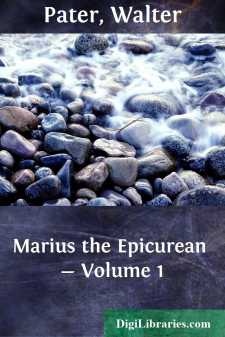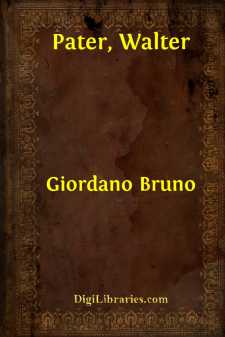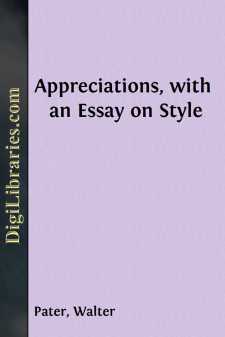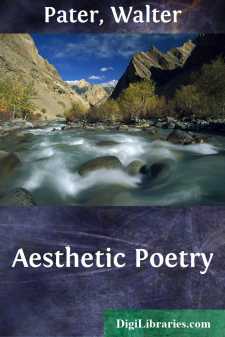Categories
- Antiques & Collectibles 13
- Architecture 36
- Art 48
- Bibles 22
- Biography & Autobiography 813
- Body, Mind & Spirit 142
- Business & Economics 28
- Children's Books 17
- Children's Fiction 14
- Computers 4
- Cooking 94
- Crafts & Hobbies 4
- Drama 346
- Education 46
- Family & Relationships 57
- Fiction 11829
- Games 19
- Gardening 17
- Health & Fitness 34
- History 1377
- House & Home 1
- Humor 147
- Juvenile Fiction 1873
- Juvenile Nonfiction 202
- Language Arts & Disciplines 88
- Law 16
- Literary Collections 686
- Literary Criticism 179
- Mathematics 13
- Medical 41
- Music 40
- Nature 179
- Non-Classifiable 1768
- Performing Arts 7
- Periodicals 1453
- Philosophy 64
- Photography 2
- Poetry 896
- Political Science 203
- Psychology 42
- Reference 154
- Religion 513
- Science 126
- Self-Help 84
- Social Science 81
- Sports & Recreation 34
- Study Aids 3
- Technology & Engineering 59
- Transportation 23
- Travel 463
- True Crime 29
Walter Pater
Walter Pater (1839–1894) was an English essayist, critic, and fiction writer known for his advocacy of "art for art's sake." His most influential work, "Studies in the History of the Renaissance" (1873), explores Renaissance art and culture through a lens of aesthetic appreciation. Pater's prose is celebrated for its beauty and precision, and he significantly influenced the Aesthetic Movement and writers like Oscar Wilde.
Author's Books:
Sort by:
by:
Walter Pater
I. A PRINCE OF COURT PAINTERS EXTRACTS FROM AN OLD FRENCH JOURNAL Valenciennes, September 1701. [5] They have been renovating my father's large workroom. That delightful, tumble-down old place has lost its moss-grown tiles and the green weather-stains we have known all our lives on the high whitewashed wall, opposite which we sit, in the little sculptor's yard, for the coolness, in...
more...
by:
Walter Pater
PREFACE Many attempts have been made by writers on art and poetry to define beauty in the abstract, to express it in the most general terms, to find a universal formula for it. The value of these attempts has most often been in the suggestive and penetrating things said by the way. Such discussions help us very little to enjoy what has been well done in art or poetry, to discriminate between what is...
more...
by:
Walter Pater
[3] THE very finest flower of the same company—Aurelius with the gilded fasces borne before him, a crowd of exquisites, the empress Faustina herself, and all the elegant blue-stockings of the day, who maintained, people said, their private "sophists" to whisper philosophy into their ears winsomely as they performed the duties of the toilet—was assembled again a few months later, in a...
more...
by:
Walter Pater
CHAPTER I: "THE RELIGION OF NUMA" [3] As, in the triumph of Christianity, the old religion lingered latest in the country, and died out at last as but paganism—the religion of the villagers, before the advance of the Christian Church; so, in an earlier century, it was in places remote from town-life that the older and purer forms of paganism itself had survived the longest. While, in Rome,...
more...
by:
Walter Pater
[234] IT was on the afternoon of the Feast of Pentecost that news of the death of Charles the Ninth went abroad promptly. To his successor the day became a sweet one, to be noted unmistakably by various pious and other observances; and it was on a Whit-Sunday afternoon that curious Parisians had the opportunity of listening to one who, as if with some intentional new version of the sacred event then...
more...
by:
Walter Pater
[3] THE making of an anthology of English prose is what must have occurred to many of its students, by way of pleasure to themselves, or of profit to other persons. Such an anthology, the compass and variety of our prose literature being considered, might well follow exclusively some special line of interest in it; exhibiting, for instance, what is so obviously striking, its imaginative power, or its...
more...
by:
Walter Pater
STYLE [5] SINCE all progress of mind consists for the most part in differentiation, in the resolution of an obscure and complex object into its component aspects, it is surely the stupidest of losses to confuse things which right reason has put asunder, to lose the sense of achieved distinctions, the distinction between poetry and prose, for instance, or, to speak more exactly, between the laws and...
more...
by:
Walter Pater
[213] THE "aesthetic" poetry is neither a mere reproduction of Greek or medieval poetry, nor only an idealisation of modern life and sentiment. The atmosphere on which its effect depends belongs to no simple form of poetry, no actual form of life. Greek poetry, medieval or modern poetry, projects, above the realities of its time, a world in which the forms of things are transfigured. Of that...
more...


